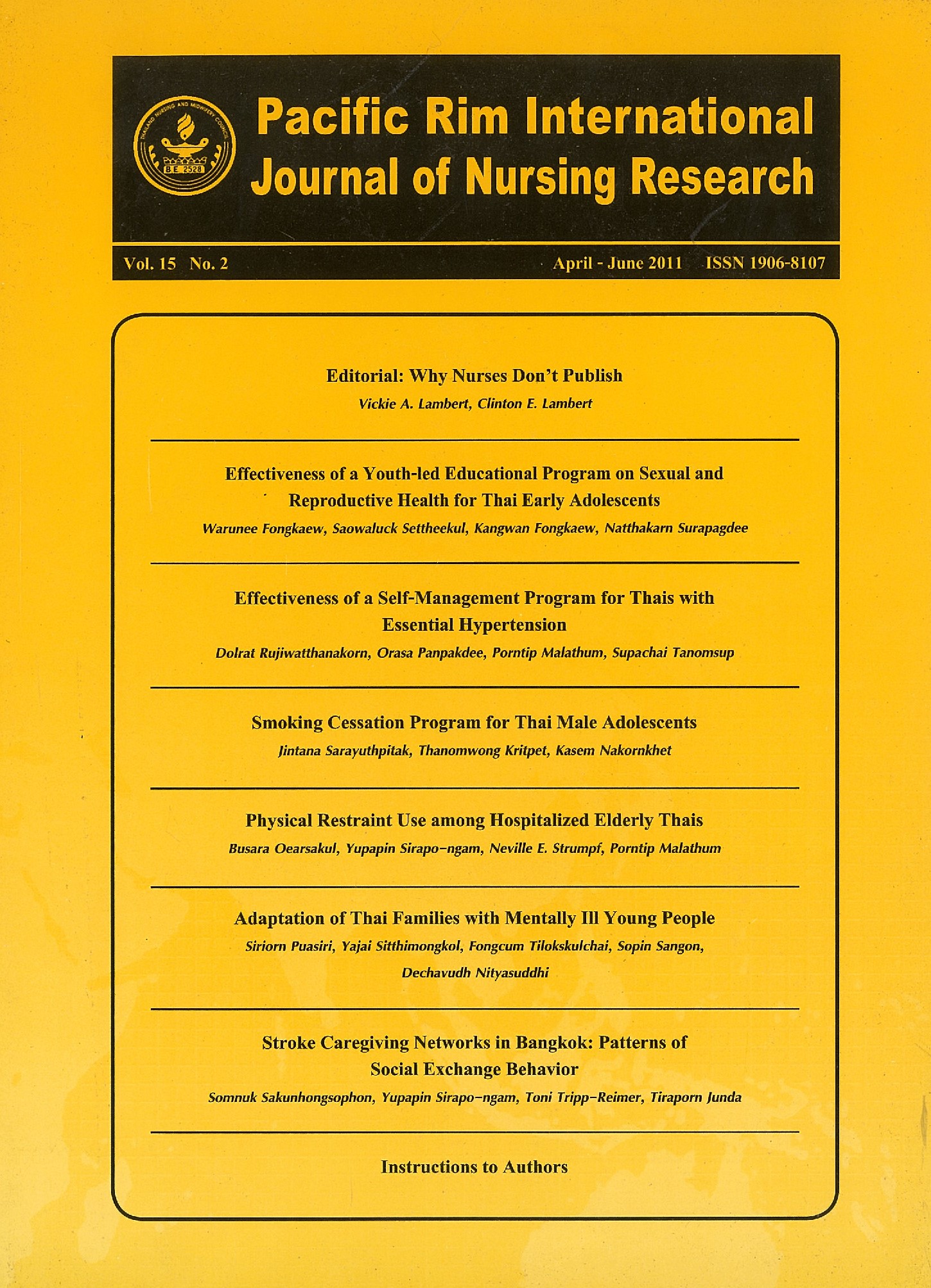Smoking Cessation Program for Thai Male Adolescents
Keywords:
กิจกรรมแทรกแซง, การปรับเปลี่ยนพฤติกรรมการสูบบุหรี่, วัยรุ่นชายไทย, Intervention activities, Smoking behavior changes, Thai male adolescentsAbstract
บทคัดย่อ
วัตถุประสงค์ของการวิจัย เพื่อพัฒนาโปรแกรมเลิกบุหรี่สำหรับวัยรุ่นชายไทย โดยใช้ทฤษฎีขั้นตอนการเปลี่ยนแปลงพฤติกรรม ทฤษฎีแรงจูงใจเพื่อป้องกันโรค และทฤษฎีการกระทำด้วยเหตุผล และเพื่อประเมินประสิทธิผลของโปรแกรม ใช้การวิจัยกึ่งทดลองแบบ 2 กลุ่มเปรียบเทียบก่อนและหลังการทดลอง โปรแกรมประกอบด้วย 10 กิจกรรม (1. สังเกตตนเอง 2. รู้เท่าทันบุหรี่ 3. เสริมแรง 4. คำมั่นสัญญา 5. ปาร์ตี้ไร้ควัน 6. ฝึกจิตสมาธิ 7. ข้อมูลออนไลน์ 8. บัดดี้พาเลิก 9. รับรู้สู่ปฏิบัติ และ 10. รับคำปรึกษา) เพื่อเพิ่มความรู้ เจตคติ และความพยายามเพื่อเลิกบุหรี่
การประเมินประสิทธิผลของโปรแกรมใช้กลุ่มตัวอย่างเป็นวัยรุ่นชายไทยโดยการเลือกแบบเจาะจงจำนวน 40 คน จากโรงเรียนระดับมัธยมศึกษาตอนปลายจำนวน 2 โรงเรียนในกรุงเทพมหานคร โดยนักเรียนกลุ่มทดลอง 20 คน จาก 1 โรงเรียนเข้าร่วมกิจกรรมที่ใช้แทรกแซงทั้งหมด และนักเรียนอีก 20 คน จากอีก 1 โรงเรียน เป็นกลุ่มควบคุมที่ไม่ได้เข้าร่วมกิจกรรม เพื่อเปรียบเทียบโคตินินในปัสสาวะของ 2 กลุ่ม ร่วมกับการทดสอบความรู้ เจตคติ และการปฏิบัติในการเลิกบุหรี่ ก่อนและหลังการทดลอง
ผลการทดสอบพบว่าโคตินินในปัสสาวะของกลุ่มทดลองต่ำกว่ากลุ่มควบคุมอย่างมีนัยสำคัญทางสถิติ ในขณะที่คะแนนความรู้ เจตคติ และความพยายามเพื่อเลิกบุหรี่ สูงกว่ากลุ่มควบคุมอย่างมีนัยสำคัญทางสถิติ ผลการวิจัยแสดงให้เห็นว่าโปรแกรมมีประสิทธิผล ทำให้วัยรุ่นชายไทยเปลี่ยนแปลงพฤติกรรมการสูบบุหรี่
คำสำคัญ : กิจกรรมแทรกแซง, การปรับเปลี่ยนพฤติกรรมการสูบบุหรี่, วัยรุ่นชายไทย
Abstract
The purposes of this study were to: develop a smoking cessation program, based upon the Trans-theoretical Model of Health Behavior Change, Protection Motivation Theory and Theory of Reasoned Action, for Thai male adolescents; and, evaluate the effectiveness of the program using a pre-post test experimental design. The program consisted of 10 intervention activities (health assessment; smoke-free party; contracting; self-help manual; cessation counseling; buddy support system; social support; tailored messages; web-based information and counseling; and, relaxation techniques) developed for the purposes of enhancing knowledge about, attitude toward and cessation of cigarette smoking.
The effectiveness of the program was assessed using 40 purposively selected Thai male adolescents from two high schools in Bangkok. The 20 member experimental group participated in all the intervention activities, while the 20 member control group did not participate in the activities. Effectiveness of the program was assessed via examination of urine cotinine of the experimental and control groups. In addition, a pre and post-test evaluation was conducted regarding the subjects’ knowledge about smoking, attitude toward smoking and attempts to stop cigarette smoking.
Following implementation of the program, the experimental group’s urine cotinine levels were significantly lower and their post-test scores were significantly higher, than those of the control group. These findings suggest the program was effective in modifying the subjects’ smoking behavior.
Keywords : Intervention activities, Smoking behavior changes, Thai male adolescents
Downloads
How to Cite
Issue
Section
License
Copyright: The Pacific Rim International Journal of Nursing Research, Thailand Nursing & Midwifery Council has exclusive rights to publish, reproduce and distribute the manuscript and all contents therein.








.png)



